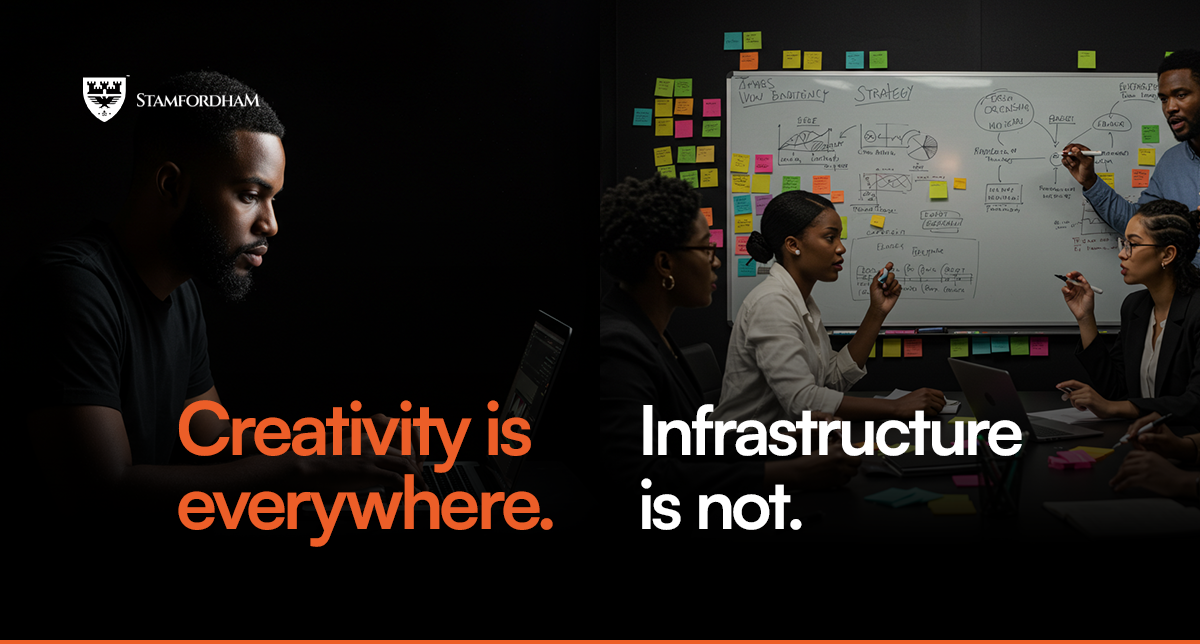Talent Isn’t Enough: Why Institutions Will Shape Africa’s Creative Economy
July 2, 2025— Written by admin

Africa’s creative scene is booming. Music, fashion, art and tech are reaching global audiences. UNESCO estimates that Africa’s creative industries are worth about $4.2 billion and growing at over 7% a year. Yet many young creators still work alone, juggling side projects and fretting over money. The old idea of a secure “job” is fading. Instead, we have digital creators and entrepreneurs, freelancers, artists and innovators with big ideas but few guides on how to build lasting businesses. The digital tools are there, but often the training, funding and support aren’t. One report found that even with mobile tech rising, most creatives still struggle to access credit or benefit from the value of their work. The challenge lies not in talent, but in the lack of infrastructure.
Many African creators know the grind: celebrate hustle, ignore burnout. We hand someone a website or a camera, then expect them to figure out taxes, contracts and long-term plans on their own. As one expert put it, we’ve built platforms, but not infrastructure. We celebrate hustle but ignore burnout. Working solo can feel like constantly starting over. There’s no clear path, and success becomes a matter of luck, not skill. Creatives end up stuck in survival mode, reinventing the wheel instead of building on real systems.
What if there were another way where creative business hubs or institutions run by and for artists and makers? Instead of just talent, they provide planning tools and teams, clear steps to take a project from idea to market. They set fair prices and quality standards so clients trust the work. They teach money management and help reach bigger markets. They equip creatives with real business skills, not just inspiration. This kind of support can turn chaos into order and burnout into growth.
A “creative institution” might sound big, but it can be simple in action. Think of it as a training and business centre for creative entrepreneurs. It would offer things like:
Growth plans: Help setting goals, budgets and timelines. (This is like having a roadmap for your work.)
Structured teams: Assigning roles so no one person must do everything, which stops projects from falling apart.
Fair standards: Agreeing on fair rates, good ethics, and quality checks so everyone wins.
Long-term strategy: Training on how to innovate and stay relevant, not just chasing the next gig.
They provide the missing link between creative skill and business success. They are to creatives what banks and schools are to other industries. When we treat creative work as a business from the start, we start seeing it as an enterprise instead of just talent.
Building these institutions is more than theory; it changes real lives. With a solid system, artists and tech makers can secure larger projects and steady clients. Work becomes more professional, earning trust and better pay. Instead of scrambling between small gigs, teams can focus on growth. This also spreads wealth: it’s not just the founder who benefits, but the whole team and even the wider community.
This approach can make Africa globally competitive. Imagine a Lagos film studio, a Nairobi design agency or a Johannesburg media lab that follows clear business practices. They can bid on big international contracts, raise serious investment, and show the world African creativity at its best. The message from experts is clear: creativity must be valued as capital, with our culture and ideas seen as drivers of real economic growth.
Even now, African creative entrepreneurs are lighting the way. For example, Nigerian blogger Temi Otedola turned her love of fashion and travel into a business with a strong online brand. South African designer Vanessa Gounden built an award-winning clothing line blending heritage and modern style. Kenyan music group Sauti Sol used its fame to launch other ventures. These success stories show the hunger. Africans are eager to turn passion into profit and share their culture globally.
However, many still hit walls: lack of money, weak internet, or no one to teach them business basics. A recent study of 400+ creatives in Africa found that many creatives aren’t ready for investment, and many investors are unsure about supporting the sector. That gap slows growth. What’s needed is simple: a framework of support. Tailored training programs, mentorship, funding designed for artists, and policies that understand how creativity works.
The good news is that the blueprint exists. The creative economy is Africa’s next big thing, and people want to invest in it. Organisations like Mastercard Foundation and UNESCO have noted Africa’s rising influence in the creative industries. Urban creative hubs are popping up from Lagos to Johannesburg, and new programs mix grants with training (think of music star Mr. Eazi’s Empawa Africa platform, which supports new artists).
But it will take us creatives, entrepreneurs, and supporters to build the bridge. We need creative CEOs, not just freelancers. Leaders who run studios and companies with clear plans and vision. When we invest time and money into training, share our networks, and set high standards, we enable everyone to thrive. We must stop treating creators as lone fighters and instead build business homes for creativity.
The quiet revolution is here. If we give African creators the systems and support they need, they won’t just survive, but lead the global market. By building these creative institutions, we turn raw talent into lasting change, creating jobs and wealth across our communities. It’s time to move from hustle to sustainable growth. Let’s build it.